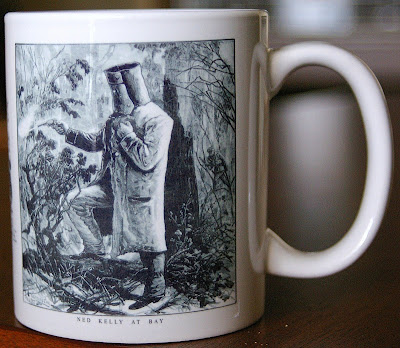Towards the end of the above clip, noted Kelly historian Ian Jones speculates on the possible Imperial response to a successful Kelly Gang's Glenrowan siege and subsequent declaration of a North East Victorian republic. Jones is the author of the excellent 'Ned Kelly: a Short Life', a book that combines the best of the biographical with the socio-political to a degree that no other Kelly book attains. Jones draws alot of the sociological elements of his work from the, unfortunately, now out of print, 'The Kelly Outbreak 1878-1880: the Geographical Dimensions of Social Banditry' by John Mcquilton, who characterizes the Kelly gang as fitting the 'social bandits' model as defined by Hobsbawn.
Both authors place the Kelly outbreak within the broader context of a rural colonial class system which produced enormous antagonism between wealthy large-scale landowners ('Squatters') and impoverished small landowners ('selectors'). Attempts by the State government to encourage greater equity and more of the rural working class to take up farming ( following the end of the Gold Rush ) largely resulted in further disparity in land and resources ownership, as the various land selection acts were easily circumvented by the squatters and used by them to acquire even more land holdings. Moreover, the interests of the wealthy tended to dominate the local power structures. Squatters, for example, often paid the police handsome rewards for cooperating with local Stock Protection Societies and the vigorous prosecution of their so called 'enemies'. The Kelly family was a particular target of squatter James Whitty and the constabulary, who deemed the Kellys as irredeemably criminal. Such persecution only mounted following the radical Victorian Premier Berry's attempt to break the upper classes control of the Upper House and the public services ( including, of course, the criminal justice system ) when he threatened to introduce mass sackings of, among others, the Victorian police forces, following the Upper Houses blocking of his governments supply. This threat of sacking resulted in an even closer relationship of interest between graziers and police, and also encouraged the radicalisation of police methods as they sought to further prove their effectiveness and worth to government. For the Kellys this meant an increase in special police attention.
Further rural stresses were produced by the onset of drought and an early form of modernity as the advent of the railway, for example, isolated those communities of the North East that were bypassed, and the introduction of new technologies, the costs of which were beyond the means of many poorer farmers who were desperate to make their small land holdings viable. Hence, the symbolic significance of the Kelly gang manufacturing their body armour out of the unproductive technology of plough share boards.
All of the above Jones and Mcquilton use to suggest that the actions of the Kelly gang, and the support of a large sympathiser network used by the gang to evade capture for some twenty months, was not just some simple act of lawlessness, but rather a "semi-political" form of social resistance. Jones, in fact, was the first author to argue that Ned and the gang eventually planned (however vague and naive) the formation of a republic for the discontented rural poor (and not just confined to Irish Australians) of North East Victoria. He argues that the famous Jerilderie Letter foreshadows such a concept:
It will pay the government to give those people who are suffering innocence justice and liberty if not I will be compelled to show some colonial strategem which will open the eyes of not only the Victorian police and inhabitants but also the whole British army. No doubt they will acknowledge their hounds were barking at the wrong stump, and that Fitzpatrick will be the cause of greater slaughter to the Union Jack than St. Patrick was to the snakes and toads in Ireland.
Furthermore, the whole Glenrowan siege itself, Jones maintains, can only be understood as the first vital step towards the realisation of this new republic: the planned killing of the trainload of police, and the capture of the senior police officers for use as hostages; the intention to bail up several local banks to help fund the new movement ; the use of fireworks to signal to the armed sympathisers the commencement of the uprising; Ned's leaving of the Ann Jones Inn to warn the supporters to leave once the failure of the siege was apparent, etc.



No comments:
Post a Comment